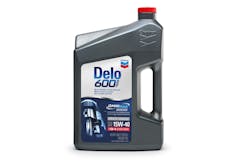Chevron recently announced the introduction of its Delo 600 ADF with OMNIMAX heavy duty engine oil, which became available on Dec. 2. The heavy-duty engine oil was designed in response to an industry-wide challenge: metal additives in engine oils which can clog the diesel particulate filter (DPF).
In a recent address to media, James Booth, commercial sector manager, North America, Chevron, explained how Chevron stepped outside of the "chemical box" the industry had been constrained to in previous decades of engine oil development. In the past, the practical reason for the use of metallic additives as part of the engine oil formulation had primarily revolved around performance requirements and their relatively cost-effective implementation, said Booth.
Chevron recognized the correlation between metallic additives, sulfate ash, and DPF clogging. The question they posed: “Is it possible to formulate an engine oil that passes industry emission and performance tests without metallic additives?”
The development process for the updated engine oil formulation began with the most critical industry tests and the incorporation of different formulating processes, said Booth. The formulating processes examined the metallic additives, how they performed, their functions, and their benefits; the goal was to use organic chemistry to replicate the function of the metallic additives.
The Chevron team found success in this process by not only decreasing sulfate ash by 60%, but also discovering increased fuel economy benefits and engine wear protection with their utilization of organic compounds.
“There were a number of cases through this formulating approach [in which] it opened doors in performance delivery,” said Booth. “Cam wear protection was extremely strong.”
The new engine oil would be ideally suited for short fleets and those with urban route applications, where the engine and aftertreatment systems do not reach high enough operating temperatures to initiate passive DPF regeneration.
Additionally, long haul fleets would also benefit using Delo 600 ADF due to the improved fuel economy found in testing.
“Right out of the gate, a change to this oil will bring 1.2% savings in fuel economy,” said Booth. The Delo 600 ADF viscosities available on launch will include 15W-40 and 10W-30.
When asked if the Delo 600 would be developed further to offer even lower viscosity ranges, Booth addressed that the shift to lower viscosity engine oils is on Chevron’s radar. He anticipates the industry to continue the shift to lower-viscosity engine oils, and eventually reaching 0W-20 – but it will not be for several years. In the meantime, Chevron will continue to develop engine oils to address the needs of the industry.




